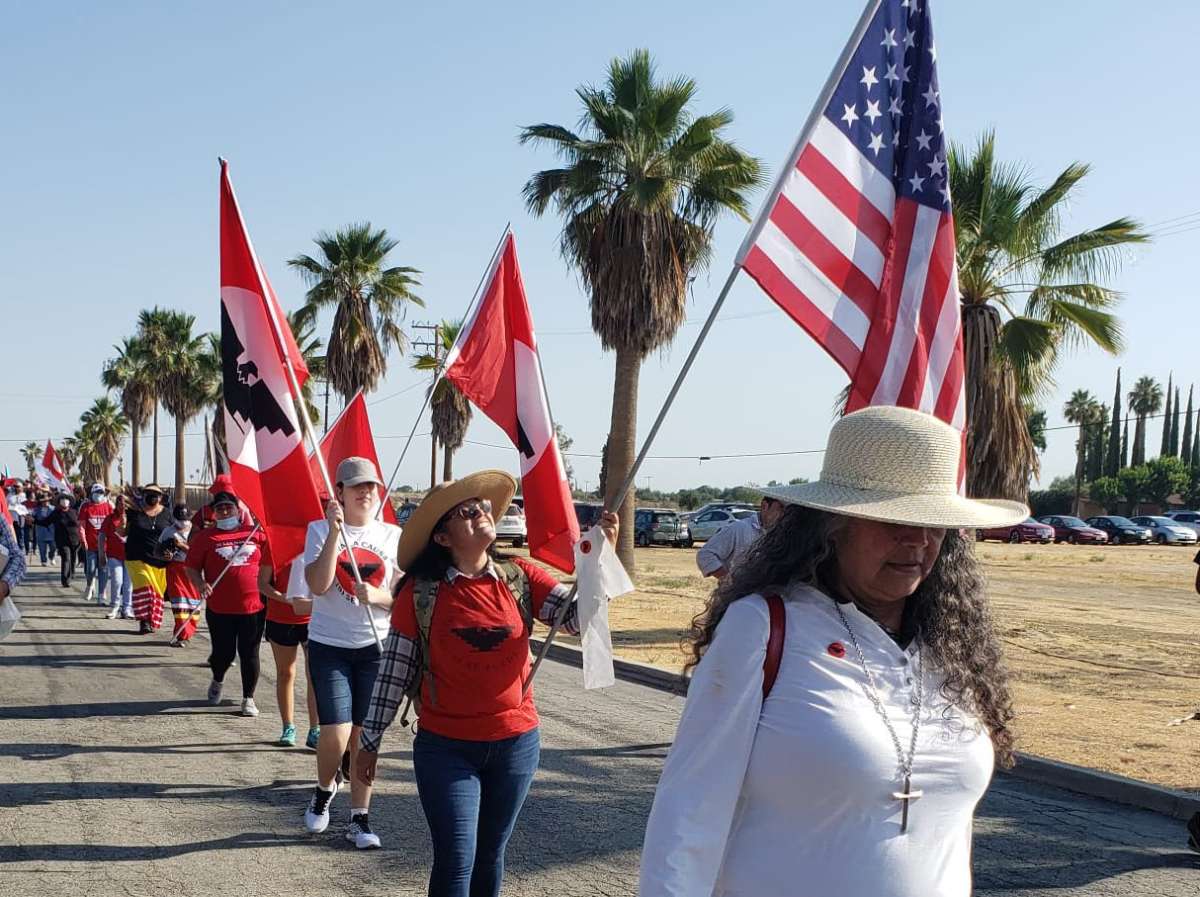Did you know that Truthout is a nonprofit and independently funded by readers like you? If you value what we do, please support our work with a donation.
On Wednesday, around 250 farmworkers and their supporters took their first steps of a 24-day Delano-to-Sacramento march to demand more voting options for farmworkers when casting a ballot on unionization.
The march, organized by United Farm Workers, or UFW, has been billed as the “March for the Governor’s Signature,” a reference to demands that California Gov. Gavin Newsom sign a new bill meant to protect farmworkers from voter suppression by employers.
“California is a very wealthy state and agriculture contributes to that wealth, but farmworkers continue to be poor and their families suffer — that’s what we need to change,” Dolores Huerta, co-founder of the UFW, told a crowd of marchers gathered at Forty Acres, the site of UFW’s original headquarters in Delano.
“We want everything that you’re doing here to reach the hearts of the growers and the heart of the governor,” said Huerta, before shouting “Si se puede,” a phrase she originated in 1972, while campaigning against legislation that denied workers’ right to organize during harvest seasons.
Over the next several weeks, participants are expected to march roughly 15 miles per day, before reaching the state capital in Sacramento on Aug. 26, which Gov. Gavin Newsom declared “California Farmworker Day” last October. They’ll be marching in the scorching summer heat, behind the same Lady of Guadalupe banner that UFW has been using since the 1960s.
According to Elizabeth Strater, director of strategic campaigns at UFW, that history was palpable during the march’s launch, which she called a kind of “family reunion” for farmworkers, organizers, clergy and other union workers who attended in solidarity with the farmworker movement.
The new bill — the Agricultural Labor Relations Voting Choice Act, AB 2183 — would allow farmworkers to cast a vote on unionization through mail-in ballots or at a drop-off location. Current regulations dictate that workers must cast ballots at in-person-only polling places, typically located at their place of employment, where they may face intimidation from supervisors.
“The vast majority of those elections are on the growers’ property, under the watchful and often retaliatory eye of their bosses,” said Strater, who explained that such a system has “an incredibly chilling effect” on a largely undocumented workforce.
Even as policymakers have lauded farmworkers as essential workers at the height of the COVID-19 pandemic, they’ve largely sided with the agricultural industry in curtailing or neglecting workers’ right to organize over the past several years. As of 2021, fewer than three percent of farmworkers belong to a union, and farmworkers still lack the right to collectively bargain and unionize in most states.
On Cesar Chavez Day this April, farmworkers and advocates organized marches in 13 California cities criticizing the governor’s continued refusal to meet with farmworkers to discuss the most recent bill. Newsom also vetoed a similar bill in September 2021, which would have allowed for mail-in unionization ballots.
Farmworker organizers faced another blow in June 2021, when the Supreme Court ruled in Cedar Point Nursery v. Hassid that labor organizations could no longer go on grower’s property to meet with workers.
Still, longtime organizers like Roberto “El Capitan” Bustos, who led UFW’s famed 400-mile march to Sacramento in 1966, were in attendance on Wednesday to encourage marchers to persevere despite political setbacks.
“I’m here again — I’m still marching,” Bustos told those gathered on Wednesday. “You can’t get lost. Follow our footprints. You’re going to see our footprints along the way.”
A terrifying moment. We appeal for your support.
In the last weeks, we have witnessed an authoritarian assault on communities in Minnesota and across the nation.
The need for truthful, grassroots reporting is urgent at this cataclysmic historical moment. Yet, Trump-aligned billionaires and other allies have taken over many legacy media outlets — the culmination of a decades-long campaign to place control of the narrative into the hands of the political right.
We refuse to let Trump’s blatant propaganda machine go unchecked. Untethered to corporate ownership or advertisers, Truthout remains fearless in our reporting and our determination to use journalism as a tool for justice.
But we need your help just to fund our basic expenses. Over 80 percent of Truthout’s funding comes from small individual donations from our community of readers, and over a third of our total budget is supported by recurring monthly donors.
Truthout has launched a fundraiser to add 500 new monthly donors in the next 9 days. Whether you can make a small monthly donation or a larger one-time gift, Truthout only works with your support.
